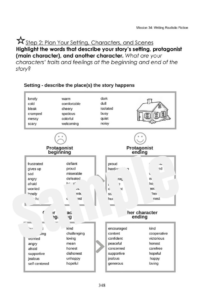Hey, homeschoolers! If your child hates to write, you’re in the right place. My kids were the same until I learned why they hated writing and what to do about it. Listen to the podcast for the solution to reluctant writers.
Why Kids Hate to Write and How We Can Fix It
#1 Your child’s handwriting speed is too slow.
The first reason your child hates to write is because your child’s handwriting speed is too slow. You can finish reading a picture book by the time your child has formed the letter a. Your child may have learned to form the letters correctly but you may not have given him focused practice in becoming faster. If your child writes slowly, you’ll likely have a student who resists any written work. Her brain is working much faster than her fingers and it’s frustrating.
I learned that this was behind even my advanced student’s writing reluctance. It wasn’t that he couldn’t write; he just didn’t want to. Only my daughter didn’t complain about writing because she was the only one whose fine motor skills could keep up with her creativity. So what do you do if your child writes too slowly? Give your kids focused practice in writing faster–not so fast that their work is not legible–but with less of a focus on perfect formation. Faster handwriting is one of the lessons in the first volume of Grammar Galaxy: Nebula, but I have a treat for you. You can download the forms I use in the lesson right here.
Work at increasing your child’s handwriting speed, but don’t stop there. You can help your child learn to enjoy writing by making the input easier. Allow your child to dictate to you. Write what your child says on a chalk or whiteboard so he can see what he is writing. Or write it in a notebook and then go over it together. The first two volumes of Grammar Galaxy encourage ample use of student dictation so your child will learn to love writing. Next, use dictation software. I love my Dragon Dictation app for the iPhone, but Macs also have built-in dictation software that works well. Dictating is a skill for the future. I frequently dictate so I can move while I write. Dictation is perfect for your kids with ADD too. Then teach your child to type. Learning to type faster is a lesson in Grammar Galaxy Protostar. The faster your child can write, whatever the medium, the more likely he is to enjoy writing.
#2 Writing assignments aren’t structured for your child’s level.
The second reason your child hates to write is because the writing assignments aren’t structured for your child’s level. We not only have a child who writes slowly, but then we ask him to write about any topic. There are hordes of adult writers who are paralyzed by the thought of having to choose a topic, even within the broad scope of something personal, a famous person’s biography, or a science topic. Give kids a short list of specific topics to choose from instead, even if your curriculum doesn’t. Limiting choices actually increases creativity. Then provide as much support in completing the assignment as possible. It isn’t enough to tell a 2nd grader to write five sentences on her topic. Young writers need graphic organizers for their writing. These are forms that tell students exactly what to write for each part of their paper. They make the writing process seem easy. That’s why I include so many of them in Grammar Galaxy. The blank page is terrifying to all writers. Instead, young writers should have fill-in-the-blank pages or writing recipes that feel easy and fast to complete. And the younger the student, the shorter the assignment needs to be. Even more advanced writers prefer to have a short writing assignment, giving them the freedom to write more as they would like.
#3 You’re correcting instead of encouraging.
When your child’s handwriting speed has increased and the writing lesson is structured appropriately for your child’s level, your child is less likely to hate writing. But if you correct instead of encourage, your child is still likely to resist. No one likes to do something they aren’t good at. Most children see corrections and even suggestions for change to writing as a sign that they aren’t good writers. I have edited fellow adult writers’ materials and often see their discouragement upon seeing the changes I’ve made. I tell my students that every successful author is edited. Sometimes the edits are purely subjective and the author doesn’t like them. But most of the time, the edits make the work better. Writing isn’t like math where there’s one right answer. This is a truth we have to reinforce with our students frequently.
[Check out the Better Editor Game]
Before you regularly correct your children’s spelling or grammar, encourage their creativity. Express your joy in their writing, much as you would with their artwork. Be specific about what you love about it. Your child puts herself on paper and wants to hear that she is a delight. Explain that you aren’t worried about spelling or grammar mistakes. You just want your child to write. Once your child has begun to enjoy writing because you enjoy it too, you can begin to suggest a few changes. Work on just a couple of things at a time. Start with making sure each sentence begins with a capital letter and has an endmark. Make sure the word I is capitalized. If your child struggles with spelling, deemphasize it. Focus on vocabulary instead. Have your child replace weak vocabulary words like good and bad. This gentler approach to writing is one of the reasons students with dyslexia love Grammar Galaxy. But any student who resists writing because of constant correction is likely to blossom with this approach.
#4 Writing assignments are boring.
Being encouraged about something structured you’ve written with faster input is a great start. But boring assignments, reason number four, will keep your kids hating writing. Having your child constantly write out definitions to words may help them remember vocabulary, but it is not fun. I don’t want to do it. Do you? Notebooking is another writing assignment that can help your child remember what is studied but doesn’t ignite the writer within. When your aim is to teach your child to love writing, refrain from giving repetitive writing assignments. Give your kids funny writing prompts instead. Nothing has been more effective than humor in getting my kids excited about writing. Start with prompts that are already funny like the funny spring writing prompts you can subscribe to get by clicking the image below. Even better, allow your child to turn an ordinary writing prompt into a funny exercise. When your student feels freedom to use humor within appropriate limits, magic happens. In our house, I’ve had to make a rule about writing unkind things about others. But I’ve allowed my kids to use their siblings’ or friends’ names in their stories within that boundary.
Subscribers to the Grammar Galaxy newsletter receive a month’s worth of daily assignments, including fun, seasonal writing prompts. You won’t have to spend time looking for ideas on Pinterest because I’ve done the work for you.
#5 You’re anxious about your child’s writing.
You can be doing everything right with writing, but if you are doing this fifth thing, your child may still hate writing. If a homeschool parent is freaking out over their child’s homeschool progress, it’s likely to be about one of two things: slowness to read or what is perceived as poor writing skills. I know this fear. One of my children wasn’t able to learn to read using the phonetic approach that had worked with my others. I didn’t know what to do. And every time I read one of my elementary or junior high student’s papers, the spelling and grammar made me want to cry. I had failed and everyone would know. But then something amazing happened. By the time they were sophomores in high school, their writing improved significantly. Spelling improved for most of them automatically. I hadn’t used a formal spelling curriculum for them, but had corrected errors as we came to them. Grammar, which requires higher-level thinking, improved as my students developed. Most exciting was the fact that their personality, opinions, and creativity were expressed beautifully in their writing because they felt free to share it without fear. My honest appreciation for their work allowed them to continue to improve as they wrote.
[Listen to Help for Anxious Homeschoolers]
If you’re afraid your kids are terrible writers, they’ll know. Anxiety is as catchy as the common cold. Your child will be afraid she’s a terrible writer. Then she’ll resist writing because again, we all hate to do things we aren’t good at. They’ll procrastinate on every writing assignment and tell you they don’t care about writing. So relax. If you aren’t strong in writing, ask someone whose strength is writing to encourage your child and make suggestions. Believe that your child can become a competent writer who enjoys the process. As a bonus, work on your own writing while your child writes. Write your own responses to the funny writing prompts, for example. If you work to improve your writing, your confidence will carry over to your child.
#6 You don’t give your child a reason for writing.
The last reason your child hates to write is because he thinks it’s like higher-level math that he’ll never use. Your child needs a reason for writing. Show her the importance of writing in a future career she is eyeing or even better, show her how writing can help her reach her goals now. Writing is valuable in business, charity, and relationships. Writing a pitch to a business, a sign for a church event, or a status update on social media are all opportunities to practice writing that have the potential to pay off for kids.

Next, use your child’s personality to provide a reason for writing. My kids are competitive and social. Writing competitions and group read alouds have given them a reason to write. Other kids can find emotional solace in writing or a way to connect with people they care about. Have your more introverted child keep a journal. Write to your child in a shared journal or ask your child to write letters to a relative who lives far from you.
Finally, point out the importance of good writing skills as you see examples. Good writing has the power to increase the status of the writer, while poor writing can make a writer look like a fool. In Grammar Galaxy, kids learn what happens when the Gremlin tampers with the English language. As fellow guardians of the galaxy, kids have to write to save it and stop the ensuing chaos. Kids are given a reason for writing.
Grammar Galaxy helps kids love writing.
Next week, I’ll announce the launch of Volume 3 of Grammar Galaxy, which is designed for fourth graders and up or those who have completed the equivalent of Protostar, Volume 2. If you have a student at this level or below, you’ll want to subscribe to hear about special pricing and bonuses that can get your kids writing and loving it.
If you want students who love to write, increase their handwriting speed or input, structure the assignment so it’s easy and quick to complete, encourage rather than correct, give fun assignments, relax about writing, and give your child a motivating reason to write. If you do these things, you may not be raising the next Longfellow, but you can have a child who enjoys writing. And that is half the battle.
Which of these approaches will you try first? Let me know in the comments.











